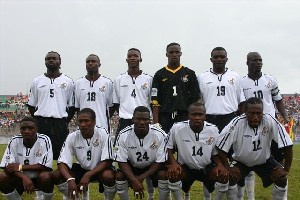Arguably the most successful footballing nation in Africa, Ghana has unbelievably never qualified for the World Cup. Goal.com?s George Tsitsonis reports on the state of the game in Ghana and how Ghanaian football may be on the verge of its finest hour.
The Long Wait Ends?
June 18th, 2005 may yet turn out to be one of the most important dates in the history of football in Ghana. It was then when the Black Stars defeated South Africa 2-0 in Johannesburg and put themselves in pole position for a historic first-ever World Cup finals berth.
Whether the national team are able to make the hopes and dreams of all Ghanaians come true remains to be seen, but for the first time in a long time there appears to at least be a reason for some level of optimism. Ghana are within touching distance of a World Cup spot, with two matches remaining they lead Group 2 in the African zone on goal difference from favorites South Africa.
At home to Uganda and then away to Cape Verde Islands in the final two fixtures, there is a cautious confidence from those who are involved in the Ghanaian game that this year is finally the time when the Black Stars will arrive on the international stage.
A Rich History
Football in Ghana arrived by way of British colonization and the sport was developed there by the British during the aftermath of occupation. The influence of the British is still visible today, not so much in the style of play, but in the names of the clubs. In 1957, Ghana was the first African country to achieve independence and Kwame Nkrumah became the new nation?s first prime minister. Until he was removed from power by a coup in 1966, Nkrumah was a leading voice of Pan-Africanism on the continent and used football as a tool to depict how strong Africa and Ghana could be. The sport became well supported and this led to Ghana becoming the most powerful footballing nation in Africa.
Unfortunately, Nkrumah?s fall from power resulted in Ghanaian football losing its status as best on the continent. Still, the national team had earned widespread respect thanks to two early African Nations? Cup successes (1963, 1965) and clubs such as Hearts of Oak and Asante Kotoko became continental powerhouses.
As time wore on and more African countries became increasingly developed and improved their football pedigree, Ghana for a plethora of reasons began traveling in the opposite direction. There was less investment in football and a lack of organization and support ensured that at least at the senior level Ghana were no longer considered a major power.
Youth Success
While the Black Stars struggled to make an impact in World Cup qualifying (the reader is reminded that in the past Africa did have fewer World Cup berths so arguably it was more difficult to qualify), the country?s young players were busy winning titles and performing wonders at the youth level. Though the senior side won two more African Nations? Cups in 1978 and 1982, perhaps the most impressive performances in Ghanaian football occurred in the later 1980?s and 1990?s thanks to the country?s sparkling youth teams.
Ghana won two U-17 FIFA World Championships in 1991 and 1995 while there were also two runners-up performances in the 1993 and 2001 U-20 World Youth Championships. These sorts of achievements spoke volumes about Ghana?s seemingly endless supply of talented young players, but also exposed the inability of the football authorities in the country to mould together a top senior side.
Over the years, Ghana has produced wonderful footballers such as Abedi Pele and Tony Yeboah just to name a few. The talent and skill is clearly there, those aforementioned players as well as many today have found their way into the first teams of some of the world?s best club teams. Still, Ghana haven?t been able to put it all together, perhaps until now.
Stability
In the past 13 years, the Ghanaian Football Association (GFA) has gone through 14 coaches. It?s obvious that long-range planning has been foresaken for short-term success. Unfortunately for Ghana, even the faintest success has never materialized. Aside from being beaten finalists in the 1992 African Nations? Cup, Ghana haven?t made as much as a whimper when attempting to win continental or international honors in the last twenty years. Their most recent World Cup qualifying campaigns have been inconsistent at best and downright miserable in some cases.
But, there is real belief that all that is about to change. After a World Cup qualifying campaign that began in terrible fashion with a 1-0 loss to Burkina Faso, the Black Stars have resurrected their hopes of heading to Germany next summer going seven matches without a loss. It?s difficult to say what has changed, but some factors are clearly evident. For starters, the talent on the pitch is perhaps Ghana?s greatest ever. With superb midfielders Michael Essien and Stephen Appiah providing defensive cover and creative sparks from the midfield, the team have two influential leaders who are leading Ghana?s march to Germany. Essien in particular is one of the hottest commodities in European football with Chelsea continuing to show their interest in the highly rated player. Add to these two some other young talents such as promising attackers Asamoah Gyan (Modena) who has three goals in World Cup qualifying and Vitesse?s Matthew Amoah and the future, immediate or not, looks very bright. At the back, Samuel Kuffour is a defender of great caliber though he is currently in a dispute with the national team and has not played in the last few qualifiers. Another defender who has ensured that Ghana has only allowed four goals in ten qualifiers is John Mensah from Chievo. The team also possesses solid goalkeeping in the form of domestic-based Sammy Adjei who plays his club football for Hearts of Oak.
The quality of the personnel is surely there for all to see, but the appointment of Serb and Montenegrin boss Ratomir Dujkovic may just be what has pulled it all together. Though credit should be given to his predecessor Mariano Berretto, the man who began the qualifying process at the helm of the national team only to leave to take over Maritimo in Portugal though some reports suggested he left after a dispute with the GFA over a disagreement regarding money available for a training camp in Europe.
Dujkovic was appointed in December of last year and has since led his new team to the top of Group 2. Dujkovic is well known around Africa thanks to his time with the Rwandan national team whom he led to the 2004 African Nations? Cup and whose performances there earned widespread praise. Once in charge of Ghana, Dujkovic employed a tactic that worked for him while with Rwanda. The former coach of the Venezuela and Burma national teams took his team to two separate training camps in Kenya, one in March and one in June before the South Africa match. The preparation seemed to work as the team gained a creditable 1-1 draw in Kinshasa against the Democratic Republic of Congo in late March and of course the impressive victory over the South Africans in mid-June.
Under Dujkovic, the Ghanaians are showing a never-say-die attitude that may ultimately lead them to the promised land that is Germany ?06. In their last two matches, the team came from behind to defeat Burkina Faso and withstood some heavy pressure by South Africa to overcome Stuart Baxter?s side. This ability not to crumble under increased pressure and now expectation is becoming the signing card of the current side. The question is now whether this characteristic will be kept for the two crucial qualifiers that remain.
Has The Time Come?
One wonders with the current momentum of Ghana?s qualification campaign whether the time has finally come for World Cup qualification. Qualifying for the World Cup could be the catalyst for major changes in football for the country. The financial rewards would be great and could be used for updating some of the poor stadia to be found in the country and developing better facilities to further the progress of the young Ghanaian players. But, it will be the intangible rewards that will really matter to the average Ghanaian fan. Imagine the suffering of these fans throughout the years as generations of class players came through the ranks, but frustratingly no great team was able to form from all the talent, at least not one that could qualify for the World Cup.
Africa?s first steps in football development were taken by Ghana, but the last quarter century has seen other countries such as Nigeria and Cameroon carry the African flag in the World Cup. Arguably the greatest football nation never to participate in the World Cup, it appears as though Ghana?s almost chronic absence from the world?s biggest sporting event may finally be over.
Two matches in September and October will decide the Black Stars? fate. Some will say, and probably rightly so, that failure to defeat the likes of Uganda and Cape Verde Islands in these last two fixtures would suggest that not only is Ghana a team that isn?t good enough to play in the World Cup, but that they don?t deserve to anyway. For now though, Ghanaians wait with increasing impatience to celebrate an achievement that is long-overdue for one of the most successful nations in Africa. We must wait until 7 October to find out what happens, but if the Black Stars can finally shine then the joy seen in the streets of Accra and all of Ghana will be unmatched as proud Ghanaians will celebrate the country?s greatest ever moment in football.

















